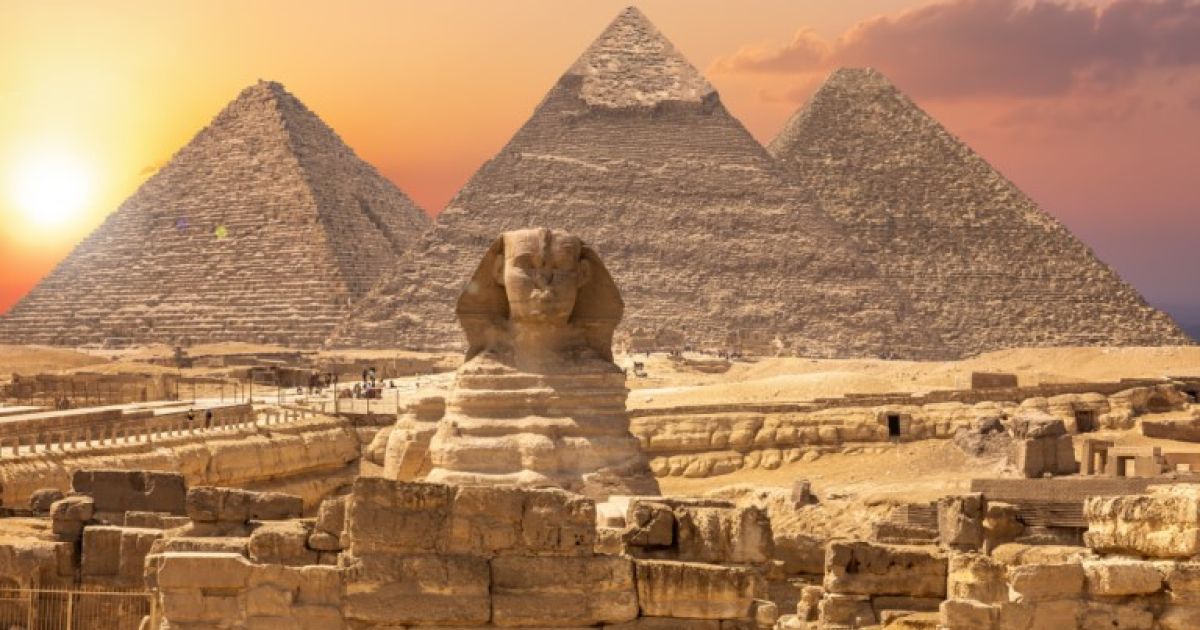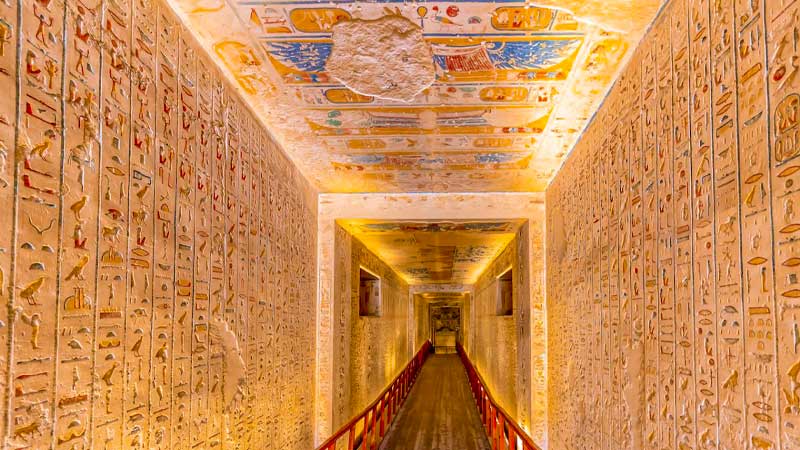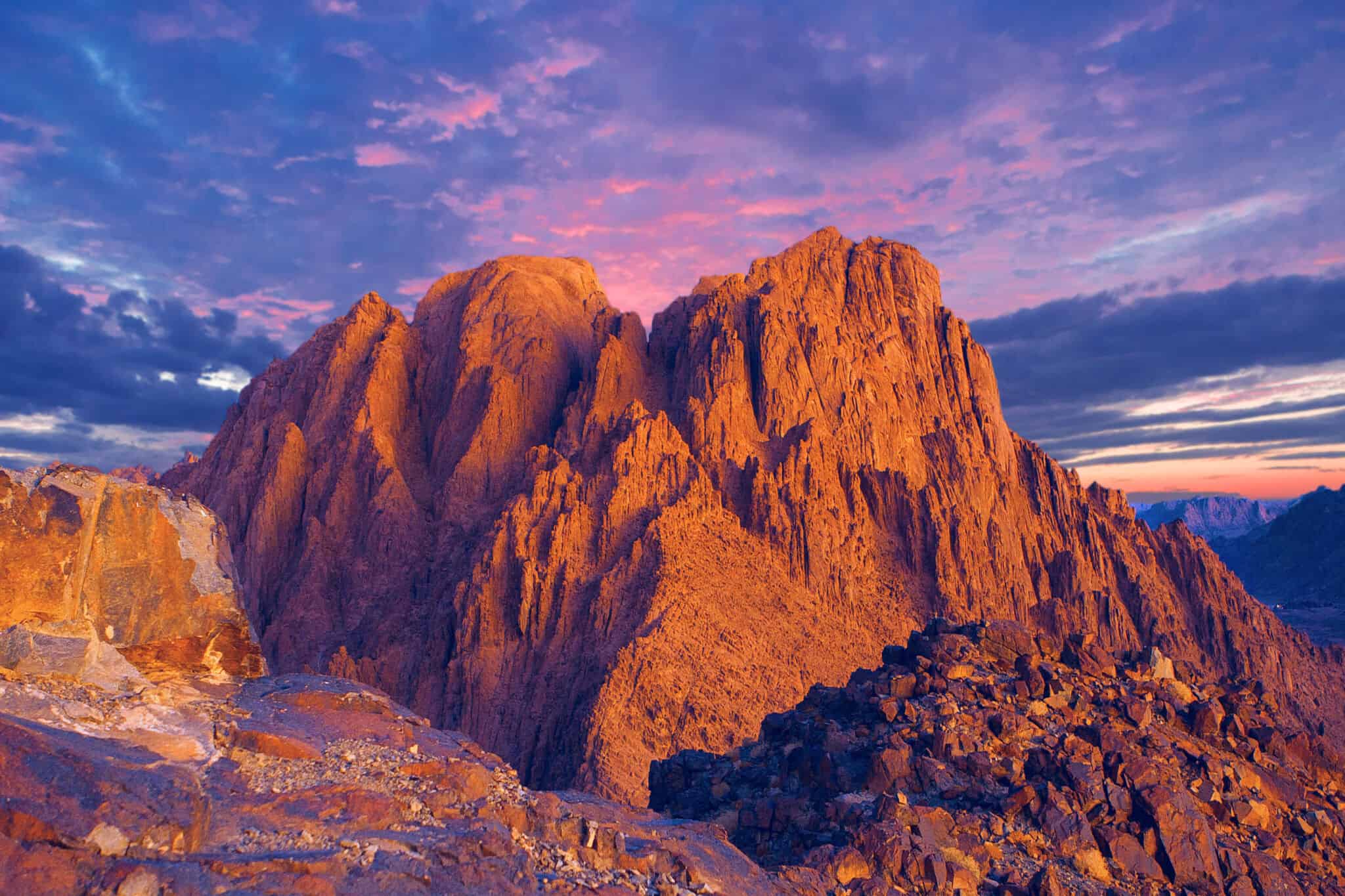Egypt, a land of rich contrasts and timeless allure, offers travelers a remarkable journey through both ancient history and incredible landscapes. Famous for its iconic monuments and historic sites, the country invites exploration far beyond the famous Pyramids of Giza. Egypt unveils a world where natural beauty and cultural heritage coexist harmoniously, from the sunlit banks of the Nile to the windswept sands of the Sahara. Discover the rich coral reefs of the Red Sea, teeming with marine life, or float down the Nile River, where kings once sailed, to immerse themselves in history at Luxor’s ancient temples and tombs.
The White Desert’s surreal limestone formations and the serene oasis of Siwa reflect Egypt’s otherworldly charm, contrasting with the historical gravitas of sites like the grand temples of Abu Simbel and the spiritual heights of Mount Sinai. Alexandria brings a Mediterranean touch, combining remnants of its Hellenistic past with a lively coastal atmosphere. For those looking for adventure or relaxation, the Red Sea Riviera also offers sandy beaches and turquoise waters.
From its mystical monuments to its natural reserves, Egypt presents a journey unlike any other. Here, one can witness the harmony of ancient ruins set against stunning desert landscapes and gaze at natural formations shaped by millennia. Egypt presents experiences that captivate the spirit and create enduring memories by enabling visitors to establish a close connection with history, the natural world, and a realm of timeless splendor. Egypt offers visitors an incredible fusion of natural beauty and historical significance, where every location is more than just a location—it is a tale waiting to be told.
Giza’s Enigmatic Pyramids
Without the Pyramids of Giza, no discussion of Egypt’s historical wonders would be complete. These imposing constructions, which date back more than 4,500 years, have come to represent ancient Egyptian culture. The Great Pyramid of Khufu is the greatest and oldest of the complex’s three principal pyramids, which are Khufu, Khafre, and Menkaure. While much is known about these awe-inspiring monuments, they continue to baffle scholars and captivate visitors with their architectural genius and alignment with celestial patterns.
Situated just outside Cairo, the Great Sphinx is a limestone statue that resembles the Pyramids of Giza. It has the head of a pharaoh and the body of a lion. The area provides a gateway into the ancient world, allowing visitors to witness the scale and ingenuity of the builders. From exploring the pyramids’ interiors to capturing photos of the sun setting behind the sphinx, Giza offers an experience steeped in wonder and mystery.

Luxor, A Journey Through Egypt’s Open-Air Museum
Luxor, often called the world’s most excellent open-air museum, is filled with a wealth of temples, tombs, and monuments that reveal Egypt’s historic grandeur. The city sits on the east and west banks of the Nile, with each side offering unique historical sites. One of the most significant religious complexes ever constructed is Karnak Temple on the east bank, where enormous statues, elaborately carved walls, and tall columns bear witness to the devotion and artistic talent of the ancient Egyptians.
The renowned Valley of the Kings, a tomb for pharaohs and nobles that includes the tomb of the young King Tutankhamun, is located on the west bank of Luxor. The complex murals, well-preserved inscriptions, and elaborate designs found in these tombs provide insight into the lives and beliefs of ancient Egyptians. Luxor Temple, another marvel on the east bank, glows beautifully at night when glowing, offering visitors an unforgettable view of this historic gem. Luxor presents a view into the magnificence of Egypt’s past, attracting history enthusiasts and travelers alike.
The Timeless Waters of the Nile
The Nile River, the world’s longest river, flows through Egypt and has been the lifeblood of the nation for thousands of years. This river not only provides energy but also serves as a historic highway, connecting ancient cities and monuments. A Nile cruise, whether starting in Luxor, Aswan, or Cairo, enables travelers to experience Egypt’s ancient wonders from a unique viewpoint. Floating down the Nile, visitors pass lush green landscapes, small villages, and ancient ruins, engaging them in a journey that mirrors the experiences of pharaohs and nobles of long ago.
In Aswan, the Nile widens and becomes dotted with small islands, including the serene Elephantine Island and the botanical wonder of Kitchener’s Island. The river can be explored more peacefully and intimately here with felucca rides, which let visitors float along its mild currents and take in the splendor that has mesmerized generations.
The White Desert, Egypt’s Surreal Landscape
Egypt’s deserts are not only vast expanses of sand but also hold surreal landscapes that seem almost otherworldly. The White Desert, located in the Farafra Oasis, is one of Egypt’s most unique natural wonders. It is known for its stunning white limestone formations, shaped over millennia by wind and sand into whimsical forms resembling giant mushrooms, animals, and abstract shapes. Together with the region’s pristine white sand, these formations provide a dramatic visual contrast to the surrounding desert’s golden tones. Visitors to the White Desert frequently set up camp for the night. The White Desert is a witness to the talent of nature, showcasing landscapes that leave a lasting impression.

The Majestic Temples of Abu Simbel
A wonder of ancient engineering and artistry, the temples of Abu Simbel are set into the cliffs that overlook Lake Nasser. Dedicated to the gods and Ramses himself, these temples were built in the 13th century BCE by Pharaoh Ramses II. The enormous temple features colossal statues of Ramses II seated majestically, while the smaller temple is dedicated to the goddess Hathor and Ramses’ queen, Nefertari.
Abu Simbel is incredibly fascinating because of its relocation story. To avoid flooding from the rising waters of Lake Nasser, the whole complex was taken apart and transferred to higher ground after the development of the Aswan High Dam in the 1960s. This feat of modern engineering preserved the majesty and intricacy of Abu Simbel for future generations. Twice a year, the inner reliquary is illuminated by the rising sun, drawing tourists eager to see this age-old astronomical phenomenon.
Siwa Oasis, A Hidden Paradise in the Western Desert
The Siwa Oasis, a tiny paradise with date palms, salt lakes, and natural springs, is in Egypt’s Western Desert. The oasis is well-known for its distinctive Berber culture, which offers a tranquil haven from the bustling cities and is distinct from mainstream Egyptian society. Constructed from salt and mud, the ancient Shali fort serves as a reminder of the oasis’ tenacity and long history.
In addition, Siwa is well-known for its natural hot springs, notably Cleopatra’s Bath, a circular stone pool that is said to have been visited by Cleopatra. Visitors to Siwa can relax in these mineral-rich waters, enjoying the therapeutic benefits while soaking up the beauty of the surrounding desert landscape. Siwa’s mix of natural beauty, ancient history, and distinct culture offers a unique experience for travelers looking to explore a lesser-known side of Egypt.
Ras Mohammed National Park, Egypt’s Marine Wonderland
On the southern tip of the Sinai Peninsula lies Ras Mohammed National Park, a protected area famous for its rich marine life and coral reefs. This national park offers some of the best snorkeling and diving spots in Egypt, drawing enthusiasts from around the world to explore its vibrant underwater ecosystems. The coral reefs here are home to a diverse array of marine life, including tropical fish, sea turtles, and even dolphins.
Beyond the underwater wonders, Ras Mohammed boasts scenic landscapes, with coastal cliffs, lagoons, and mangrove trees dotting its shores. This blend of marine and terrestrial ecosystems makes the park a haven for wildlife, with bird species and migratory fish finding sanctuary here. Ras Mohammed National Park shows Egypt’s dedication to preserving its natural treasures, allowing visitors to experience the country’s rich biodiversity up close.

Mount Sinai, A Sacred Peak
Mount Sinai, known as (Jebel Musa) in Arabic, is a site of significant spiritual significance for several religions. Apparently, according to tradition, it is the mountain where Moses received the Ten Commandments, therefore making it a pilgrimage site for people of various faiths. Located in the Sinai Peninsula, Mount Sinai offers visitors not only a spiritual journey but also an adventure in natural beauty.
The hike to the summit of Mount Sinai is a popular activity, with many opting to ascend at night to witness the sunrise from the peak. The rugged terrain and quiet solitude of the mountain provide a powerful atmosphere, and the view from the top, where the sun slowly illuminates the rocky peaks below, is nothing short of spectacular. The journey to Mount Sinai allows travelers to connect with nature and history in a setting that has inspired devotion for centuries.
Alexandria, A Blend of Ancient and Mediterranean Charm
On Egypt’s northern coast lies Alexandria, a city that blends its ancient heritage with the allure of the Mediterranean. Once home to the fabled Library of Alexandria and the imposing Pharos Lighthouse, Alexandria was founded by Alexander the Great. While these wonders no longer exist, the city still offers plenty to explore, including the Catacombs of Kom El Shoqafa and the Roman Amphitheater, both remnants of its storied past.
Alongside these historical sites, Alexandria’s Corniche has a picturesque waterfront promenade where locals and visitors can enjoy the sea breeze and panoramic views. The city’s unique architecture, a blend of European and Egyptian influences, gives Alexandria a character distinct from other Egyptian cities. Alexandria continues to be a welcoming destination for individuals looking for an alternative viewpoint on Egypt because of its rich history, coastal charm, and vibrant culture.
The Red Sea Riviera, Sharm El Sheikh, and Hurghada
Egypt’s Red Sea coastline is a paradise for beach lovers, divers, and anyone seeking relaxation in turquoise waters. Sharm El Sheikh, located on the Sinai Peninsula, is famous for its luxury resorts, lively nightlife, and stunning coral reefs. The nearby Ras Mohammed National Park offers world-class snorkeling and diving, enabling visitors to discover the underwater beauty of the Red Sea.
With long stretches of sandy beaches and an abundance of water sports activities, Hurghada offers a more relaxed atmosphere further north. The Red Sea Riviera is a destination where modern comforts meet natural beauty, offering an ideal escape for those seeking both adventure and relaxation.
Egypt’s Timeless Beauty
Egypt’s lasting appeal lies in its unique ability to transport visitors through time and place, offering an immersive experience that spans millennia. This country’s landscape is as diverse as its history, with ancient temples and tombs, expansive deserts, and vibrant seas creating a rich tapestry that captivates the imagination. From the colossal Pyramids of Giza and the historic temples of Luxor to the tranquil banks of the Nile, each site tells a story of ancient civilizations, remarkable ingenuity, and spiritual beliefs that have resonated across generations.
Nature lovers can explore the surreal beauty of the White Desert’s limestone formations, dive into the marine wonderland of Ras Mohammed, or unwind in the oasis of Siwa, where palm groves and salt lakes provide a peaceful retreat. For those seeking serenity, the tranquil beauty of Aswan or a sunrise climb up Mount Sinai offers a chance to connect with Egypt’s quieter, spiritual side.
Beyond its historical and natural sites, Egypt is a land of vibrant traditions, warm hospitality, and a culture that gracefully blends the old with the new. Each destination within the country offers something different, from Alexandria’s Mediterranean allure to the luxurious resorts along the Red Sea coast, providing experiences that appeal to travelers of every kind.
Egypt’s allure is timeless, with layers of history and beauty that invite a deeper appreciation for the ancient and the natural world. It is a destination that stays with visitors long after they’ve returned home, leaving them with memories of awe-inspiring monuments, breathtaking landscapes, and the sense of having connected with something truly extraordinary.










